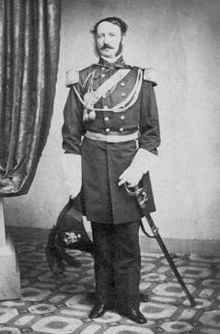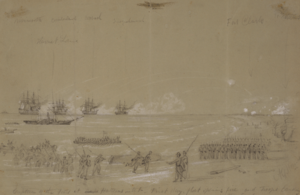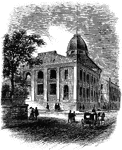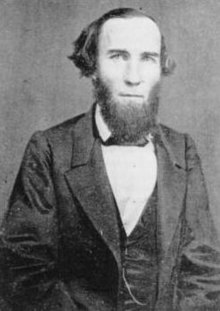| Fort Ocracoke Burning, USS Fanny in Foreground |
REPORTS.*
Numbers 1.-Brigadier General Joseph K. F. Mansfield, U. S. Army.
HEADQUARTERS DEPARTMENT OF VIRGINIA, Fort Monroe, October 5, 1861.
SIR: I have the honor to report to the Lieutenant-General commanding that yesterday afternoon the steamer Pawnee arrived from Hatteras Inlet, and brought the captain and crew of the steamer Fanny, a steamer that had been chartered as a tender and defense at the inlet. (I should have made this report by yesterday's mail if I had not been at the time of the above arrival at Newport News and did not return till after dark.) It appears that the steamer Fanny left Fort Hatteras about 6 a. m. on the 1st instant, with ammunition and supplies for the Twentieth Indiana Regiment, stationed some 40 miles on the beach northward, at a locality called Chicamacomico, or Loggerhead Inlet. She had on board Captain I. W. Hart, Sergeant-Major Peacock, and about 23 men of the Twentieth Indiana and Ninth New York Regiments, with a Sawyer gun and a large supply of ammunition and stores for the troops. When within 5 miles of her destination she met the U. S. naval steamer Putnam, which turned round and convoyed her to anchorage in 6 feet of water off the landing some 3 miles. The Putnam put on board the Fanny a rifled cannon and ammunition therefor, and then started for Fort Hatteras. At the same time stated she had seen a rebel steamer westward, and gave as reason for returning that she was short of coal. In about an hour and a half after, say at 2.30, a large flat from the shore came alongside the Fanny and received a load of supplies, such as tents, bread, &c. In about two hours after, three steamers approached from the westward, and at a long range commenced an attack. Not a shot struck the Fanny, and some eight or nine shots were fired at the enemy, one of which took effect. Then the cable was slipped and the Fanny was run ashore some 2 3/4 miles still from the beach, and the crew abandoned her in a boat, and the officer in charge, Captain Hart, hoisted a white flag, and surrendered before a gun was fired on either side. The captain of the Fanny, John M. Morison, left in a small boat with his sick son. the mate, George K. Ridgely, and engineer and others of the crew remained until the white flag was hoisted. Some ammunition was thrown overboard, but the guns were not thrown overboard nor the boat sunk, as was recommended by the mate and engineer. The steamer Fanny was an excellent boat for the station, and her boiler and engine in excellent order. The above facts I obtained from a personal examination of the captain, mate, engineer, and a deck hand separately.
Very respectfully, your obedient servant,
JOS. K. F. MANSFIELD, Brigadier-General, Commanding.
Colonel E. D. TOWNSEND, A. A. G., Hdqrs. of the Army.
Official Records, Series I., Vol. 4, Part 1, Page 495
The Confederates had scarce good news on the North Carolina Coast in the Fall of 1861. The capture of the transport U.S.S. Fanny, with thirty soldiers aboard, was an exception. In August, the Fanny became the first US warship to carry an airship aboard, when it took a balloon in Hampton Roads for observation of the straits there.














